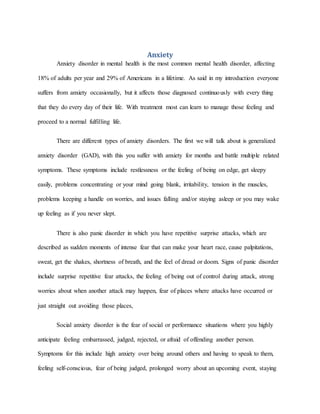Denunciar
Compartir

Recomendados
Recomendados
Más contenido relacionado
La actualidad más candente
La actualidad más candente (20)
Do you know the difference between panic and anxiety understanding the differ...

Do you know the difference between panic and anxiety understanding the differ...
Acute Stess Disorders and Post-traumatic Stress Disorders

Acute Stess Disorders and Post-traumatic Stress Disorders
Similar a Anxiety
Similar a Anxiety (20)
Overcoming Anxiety Practical Strategies for a Calmer Life

Overcoming Anxiety Practical Strategies for a Calmer Life
Shine Connect Conference - Understanding and Managing Anxiety workshop

Shine Connect Conference - Understanding and Managing Anxiety workshop
Más de Charlotte Dalton
Más de Charlotte Dalton (9)
Anxiety
- 1. Anxiety Anxiety disorder in mental health is the most common mental health disorder, affecting 18% of adults per year and 29% of Americans in a lifetime. As said in my introduction everyone suffers from anxiety occasionally, but it affects those diagnosed continuously with every thing that they do every day of their life. With treatment most can learn to manage those feeling and proceed to a normal fulfilling life. There are different types of anxiety disorders. The first we will talk about is generalized anxiety disorder (GAD), with this you suffer with anxiety for months and battle multiple related symptoms. These symptoms include restlessness or the feeling of being on edge, get sleepy easily, problems concentrating or your mind going blank, irritability, tension in the muscles, problems keeping a handle on worries, and issues falling and/or staying asleep or you may wake up feeling as if you never slept. There is also panic disorder in which you have repetitive surprise attacks, which are described as sudden moments of intense fear that can make your heart race, cause palpitations, sweat, get the shakes, shortness of breath, and the feel of dread or doom. Signs of panic disorder include surprise repetitive fear attacks, the feeling of being out of control during attack, strong worries about when another attack may happen, fear of places where attacks have occurred or just straight out avoiding those places, Social anxiety disorder is the fear of social or performance situations where you highly anticipate feeling embarrassed, judged, rejected, or afraid of offending another person. Symptoms for this include high anxiety over being around others and having to speak to them, feeling self-conscious, fear of being judged, prolonged worry about an upcoming event, staying
- 2. away from places with a lot of people, trouble making and keeping friends, or feeling sick when around others. The first step to getting your anxiety under control is to be evaluated. You start this by going to your PCP as some physical health conditions or medications can mock or worsen anxiety disorder. Also helpful is a in depth mental health evaluation since anxiety is often linked with other conditions such as depression or OCD. There are genetic and environmental risk factors that contribute to anxiety disorder. Included factors are shyness as a child, being female, finances, marital status (divorced or widowed), stressful life events, family history of anxiety or other mental disorders, or high cortisol levels in saliva. Usually therapy and/or medication are the general treatment for anxiety disorders. In order for talk therapy to be effective they have to single out your specific anxieties. Common issue with talk therapy is the uncomfortability with the thought about confronting your fears. There is also cognitive behavioral therapy which helps teach you an alternate way of thinking, behaving and reacting in stressful anxious situations. It can also help you learn social skills which can help with social anxiety. Cognitive therapy’s focal point is identifying, challenging and equaling out toxic thoughts. Meanwhile exposure therapy’s focus is taking on your fears and anxiety to help you take on things you would usually avoid. In my personal experience exposure therapy has been the best way to handle my anxiety disorder. Medications helped a little but once they wore off the anxiety was back tenfold. So whether your like me and exposure therapy works, or your one of those people that need something more the first step is always asking for the help. It’s never easy but it’s always worth it because the help gives you a better way of life!